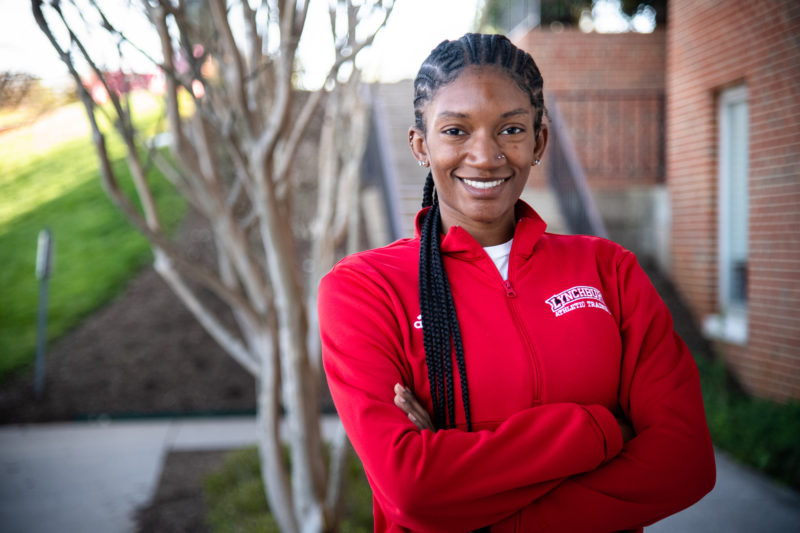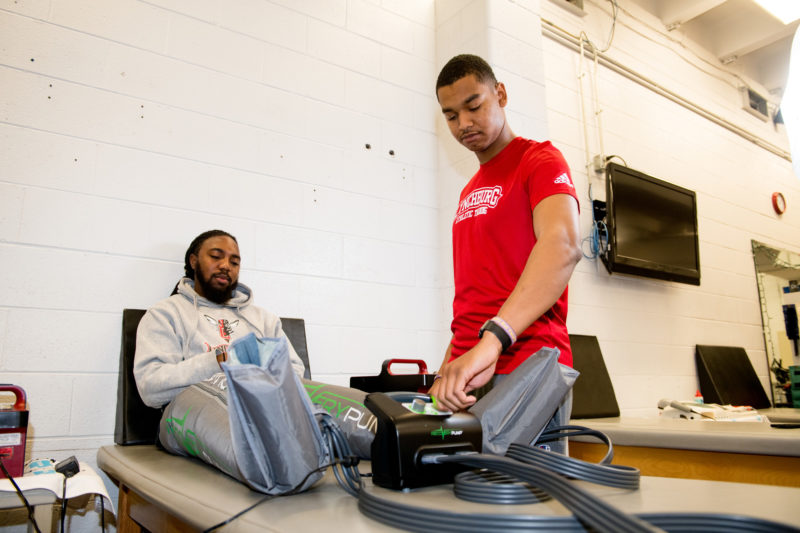
Since its first cohort in 2016, the University of Lynchburg’s Master of Science in Athletic Training program has made diversity a priority.
“Our first cohort of students was incredibly diverse and we took the opportunity to build on that foundation,” Dr. Tom Bowman, professor of athletic training, said. “Diversity is one of our program cornerstones and we have been fortunate to be able to foster learning among diverse students.”
He added that increasing diversity in the MSAT program “has been a challenge,” but it’s been important. “Diverse patients need diverse health care providers, as their experiences are unique. … Students of color make up a large percentage of collegiate contact and collision sports leading to a need for clinicians of color.”
In 2017, the MSAT program received a $2,815 grant from the National Athletic Trainers’ Association’s Ethnic Diversity Advisory Committee. The funds better enabled faculty to recruit MSAT candidates at seven historically Black colleges and universities, or HBCUs.
Since then, faculty have visited HBCUs in the mid-Atlantic region and the program has had an HBCU graduate in almost every cohort. “Our hope is that recruiting diverse students has led to an environment where justice, equity, diversity, and inclusion are celebrated,” Bowman said.
“Our students teach each other, the faculty, and our preceptors about their cultures, which improves cultural competence among all of us. Providing diverse clinicians to the workforce has the potential to improve racial concordance between clinicians and the patients we treat.”
One of the first HBCU students Bowman met after Lynchburg received the grant was Julius Murphy ’19 MSAT. At the time, Murphy was an exercise science major at Saint Augustine’s University in Raleigh, North Carolina.
Bowman gave a presentation at Saint Augustine’s, which was the first time Murphy heard about Lynchburg’s MSAT.
“My department chair at Saint Aug advised me to attend this meeting due to my interest in sports medicine,” Murphy said, adding that the “information about the University, research, and the clinical sites grabbed my attention and forced me to ask more questions.
“I stayed after to speak with [Bowman] and he made me feel welcome and offered me an opportunity to visit the school. He also provided me with instructions [on how] to apply and what to expect during this process.”

Murphy visited Lynchburg’s campus and was impressed by the hands-on learning opportunities he would have in the cadaver lab and other clinical sites, and also the faculty.
“When I met Dr. Bowman, I could feel his excitement to teach and prepare young professionals for a career in athletic training,” he said. “After taking a visit and observing the interaction between the faculty and students, I knew that Lynchburg would be home for me.”
Murphy also saw similarities between Lynchburg and his Saint Augustine’s experience. “One of the major things that was the same with both institutions was the small campus and family environment,” he said. “Everyone at Lynchburg was nice and made me feel like I was a part of the Hornet family.”
Once on campus, Murphy said he had “one of the best educational experiences” of his life. “The environment was created to make learning challenging, but fun. I gained a ton of confidence and learned a lot of life skills during my time at Lynchburg.”
Since 2021, Murphy has worked as an athletic trainer with the LA Galaxy professional soccer club in Carson, California. He currently works with players on Galaxy’s Academy teams — six teams in the U11-U17 range. “In this role, I cover trainings, games, and create injury prevention and rehabilitation programs,” he said.
Alyssa Smith ’23 MSAT also came to Lynchburg from Saint Augustine’s, where her advisor was acquainted with some of the MSAT faculty and familiar with the program. After attending an HBCU for her bachelor’s degree, Smith said she wanted to experience a different demographic.
At Lynchburg, about 26% of students — including 29% of graduate students — are people of color. At Saint Augustine’s, the study body is made up primarily of people of color. Once at Lynchburg, however, Smith said she found the campus community “very accepting.”
She also found an ally in athletic training professor Dr. Pat Aronson, whom she described as “an advocate for diversity and inclusion.” Aronson also is a founding member and first chair of the National Athletic Trainers’ Association LGBTQ+ Advisory Committee.
“We’ve had some discussions about my experience here, compared to Saint Augustine’s,” Smith said. “It was sort of a culture shock when I got here. I was kind of expecting that because there aren’t many people who look like me, but I didn’t want to stand out too much.
“But everyone’s pretty chill. I think it’s important to step out into this sort of dynamic because this is what the world sort of looks like, the corporate world as well, and I want to prepare myself for that sort of environment.”
When she graduates, Smith wants to work as an athletic trainer at an HBCU in North or South Carolina, but she believes she’ll be ready for wherever life takes her.
“It doesn’t really matter where,” the Orangeburg, South Carolina, resident said, “but I’d prefer an HBCU. Just preference, really. I like to be around my people. It’s how I grew up. And being here has prepared me for any type of challenge and adversity in the workforce.”
Asked what advice she had for other HBCU students considering Lynchburg’s MSAT program, she said she’d encourage them to step out of their comfort zones. “It’s important to indulge yourself into different environments and speak with people who don’t look like you to get an idea of what to expect in the real world,” she said.
She added that her Lynchburg experience has been “great,” so far. “My class is very diverse, so I can always depend on them, when needed, for emotional support or when it comes to assignments in school.
“My professors have been more than willing to help me with academics as well.”
As for Murphy, he would tell his fellow HBCU grads that “attending Lynchburg was the best decision I could’ve made at that time in my life. Going to Lynchburg, I made lifelong friends, created good habits for myself, and learned how to become a professional.
“I am now living my dream, working in the professional setting, doing what I love to do. All thanks to good ol’ Lynchburg.”

